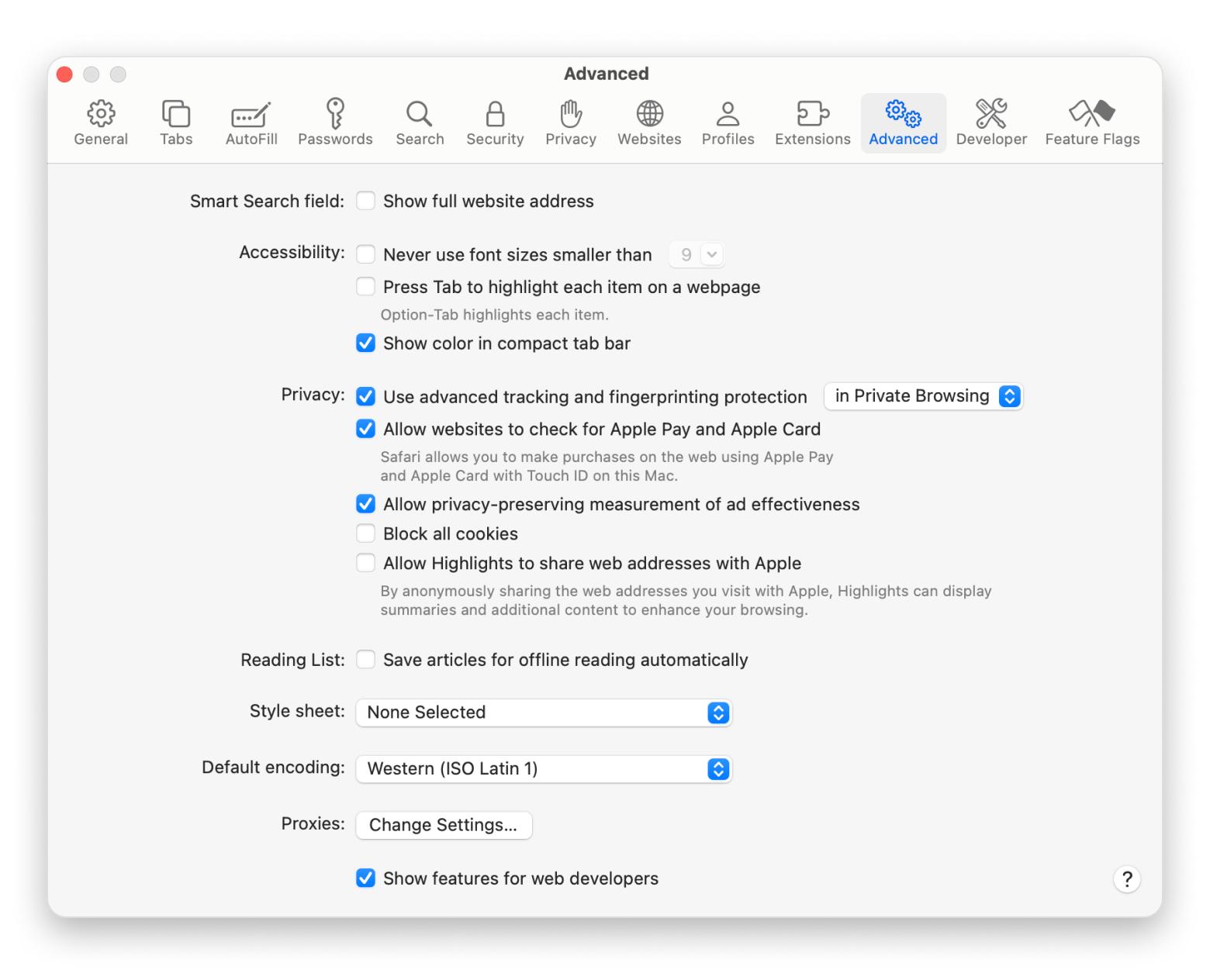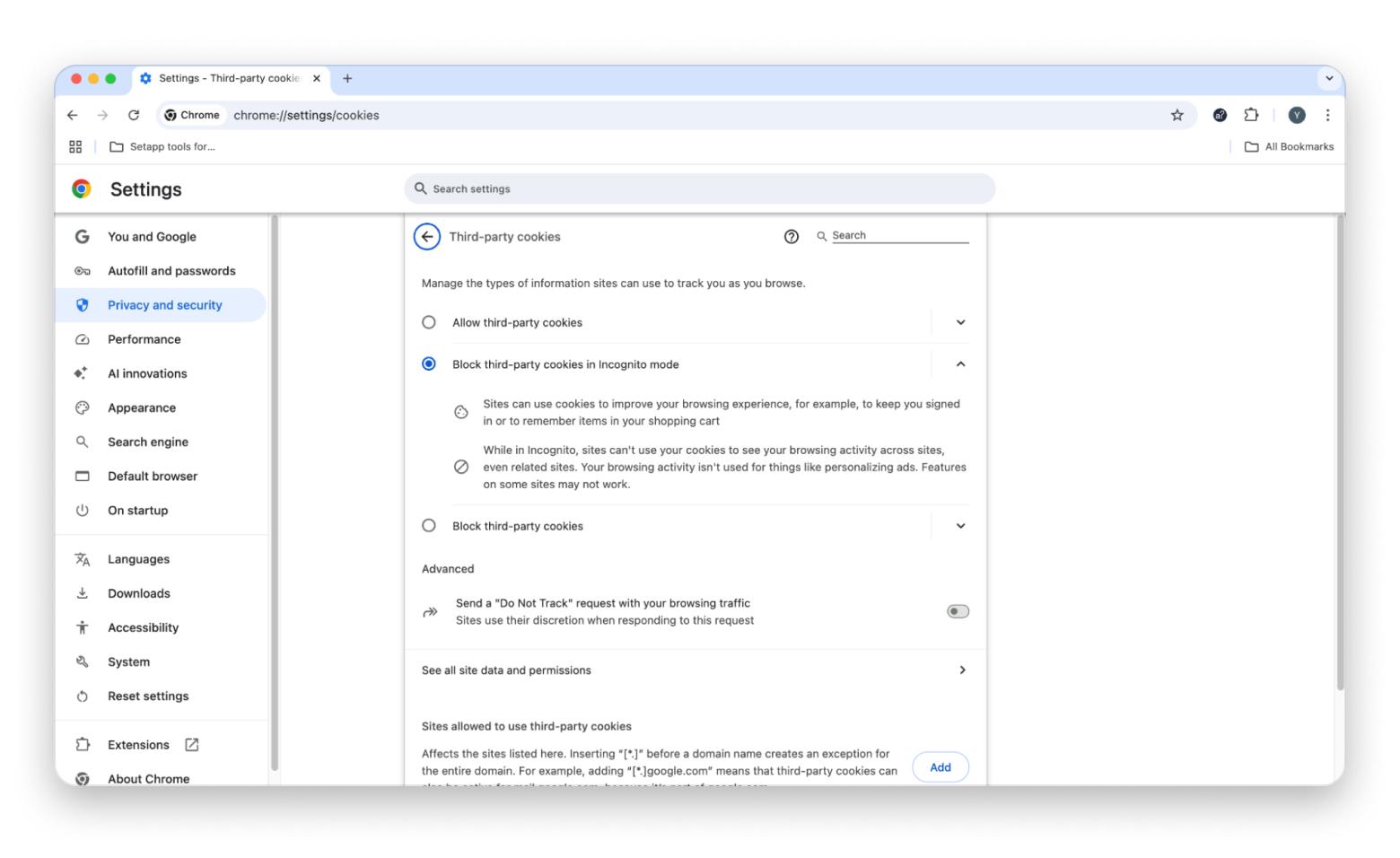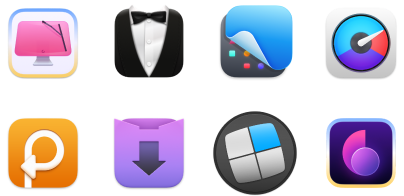How to enable cookies on Mac: How I keep sites working without tracking
A few weeks ago, I was trying to check out from an online store, but every time I clicked "Proceed to Payment," the page would just reload without moving forward. After some head-scratching, I realized the issue — my browser blocked cookies.
Love or hate them, they are a key part of how the web works. They remember your login details, keep you signed in, and ensure pages load how they should.
In this guide, I'll walk you through how to enable cookies on Mac. Plus, I'll share a few ways you can still maintain your privacy without breaking websites.
How to enable cookies on Mac
Before going far into the guide, I’ve created a summary guide to help sort out some issues quickly:
| You want to | Do this |
| Enable cookies in Safari | Open Safari > Safari > Settings > Advanced > Deselect Block all cookies. |
| Enable cookies in Chrome | Open Chrome > menu > Settings > Privacy and security > Third-party cookies > Select Allow third-party cookies. |
| Enable cookies in Firefox | Open Firefox > menu > Settings > Privacy & Security > Choose Standard or Custom (then deselect Cookies). |
| Disable cookies in Safari | Open Safari > Safari > Settings > Advanced > Select Block all cookies. |
| Disable cookies in Chrome | Open Chrome > menu > Settings > Privacy and security > Third-party cookies > Select Block third-party cookies. |
| Disable cookies in Firefox | Open Firefox > menu > Settings > Privacy & Security > Choose Custom > Check Cookies and select All cookies. |
| Remove cookies and site data | Use CleanMyMac to clear cookies and cache in a single click. |
| Block trackers while keeping necessary cookies | Use AdLock to filter out annoying ads and tracking cookies. |
| Browse privately while accepting cookies | Use ClearVPN to hide your identity. |
What are cookies on Mac?
Cookies are small pieces of data that websites store on your browser. They make it possible for these sites to remember things like your language preferences, login status, and browsing activity. If you've ever looked up an item and started getting related ads, cookies are usually the reason.
There are two main types:
- First-party cookies: These are created by the websites you visit. They store useful information like your login status and language preferences.
- Third-party cookies: These are created by various external services used by websites, such as advertisers and analytics tools. They can track your online activities across different sites.
Why you should accept cookies on Mac
Cookies aren't all bad. In fact, some sites won't work well if you disable all cookies.
Here's why it makes sense to enable cookies on Mac:
- Faster browsing: Cookies store some site information to make it load faster when you visit.
- Convenience: You can stay logged in to your favorite websites without typing a password every time.
- Personalized experience: Sites use cookies to remember your settings, language preferences, and recently viewed items.
How to enable cookies in Safari
Safari, Mac's default browser, gives users the option to block all cookies. However, this causes some sites to malfunction, and you'll need to log in every time you visit a website.
If you want things to run smoothly, here's how to enable cookies in Safari:
- Open Safari.
- Click Safari (from the menu bar) > Settings.
- Click Advanced.
- Deselect Block all cookies.

To balance privacy and functionality, you can go to the Privacy tab and ensure Prevent cross-site tracking is selected.
Learn more about how to allow 3rd party cookies on Mac.
How to enable cookies on Mac in Chrome
By default, Chrome allows website cookies while blocking third-party ones. However, you can still enable the latter for a more personalized browsing experience.
Here's how to enable cookies on Mac in Chrome:
- Open Google Chrome.
- Click the three-dot menu > Settings.
- Go to Privacy and security.
- Click Third-party cookies.
- Select Allow third-party cookies or Block third-party cookies in Incognito mode.

How to unblock cookies on Mac in Firefox
Firefox is known for being privacy-conscious, and it gives more cookie-customization options than other browsers.
Here's how to enable cookies on Mac when using Firefox:
- Open Firefox.
- Click the three-line menu > Settings.
- Go to Privacy & Security.
- Select Standard or Custom, then uncheck Cookies.
The Standard profile under Enhanced Tracking Protection allows most cookies but blocks social media trackers and cross-site cookies. If you want to allow all cookies, choose Custom and uncheck Cookies.
How to disable cookies on Mac in all browsers
Enabling cookies will allow sites to store a lot of data and make it possible for advertisers to follow you on every page you visit. You can limit this by deleting tracking cookies then turning them off.
Here's how to disable cookies on Mac when using Safari:
- Open Safari.
- Click Safari in the menu bar > Settings.
- Go to the Advanced tab.
- Deselect Block all cookies.
Here's how to disable cookies on Mac in Chrome:
- Open Google Chrome.
- Click on the three-dot menu > Settings.
- Click Privacy and security in the sidebar.
- Click Third-party cookies.
- Select Block third-party cookies.
If you use Firefox, here's how to turn off cookies on Mac:
- Open Firefox.
- Click the three-line menu in the top-right corner and select Settings.
- Go to Privacy & Security.
- Under Enhanced Tracking Protection, choose Custom.
- Select Cookies, then choose All cookies.
If you don't want to affect the functionality of websites on Firefox, choose Cross-site tracking cookies under Cookies.
Also, check out the detailed guide on how to clear cookies and cache on Mac.
Enable cookies on Mac without compromising privacy
Cookies play a huge role in making browsing much more seamless as they keep us logged in and remember our preferences. On the flip side, they open a door for online tracking and add clutter to your browser.
The good thing is that you don't have to trade your privacy for convenience, as you can easily disable or enable cookies on Mac. And if you want to keep your browser tidy, CleanMyMac can help you delete what you don't need. You can also install AdLock to block annoying ads and pop-ups, then hide your real IP address from trackers with ClearVPN.
All these apps are available on Setapp, the best alternative app store for Mac. It offers dozens of apps under a single subscription, and you can check them out for free via a 7-day free trial.
FAQ
Why are my cookies not working on Mac?
Cookies may not be working on Mac because they may enabled in your browser settings. If you suspect you have old or conflicting cookies, clear your browser's cache and cookies with CleanMyMac.
Why can't I enable cookies in Safari?
If you can't enable cookies in Safari, confirm Block all cookies is disabled under Safari > Settings > Advanced. You can also uncheck Prevent cross-site tracking under Safari > Settings > Privacy, then restart Safari. If these don't work, clear your browser's data with CleanMyMac.
Should I enable or disable cookies on my Mac?
To enable or disable cookies on your Mac depends on how you want your browsing experience. Enable first-party cookies while blocking third-party ones for a balanced experience. If you are looking for maximum privacy and want to block all tracking, you can disable your cookies.





